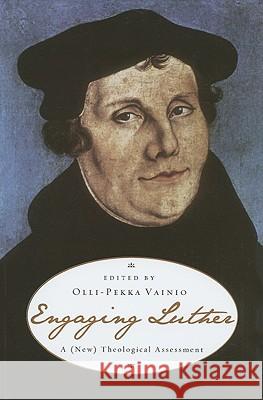Engaging Luther: A (New) Theological Assessment » książka
Engaging Luther: A (New) Theological Assessment
ISBN-13: 9781606088180 / Angielski / Miękka / 2010 / 274 str.
Engaging Luther: A (New) Theological Assessment
ISBN-13: 9781606088180 / Angielski / Miękka / 2010 / 274 str.
(netto: 122,74 VAT: 5%)
Najniższa cena z 30 dni: 127,45
ok. 16-18 dni roboczych.
Darmowa dostawa!
Description: The Reformer Martin Luther is the source of endless fascination and dispute. Not only his antagonists but also his supporters have created a host of representations of his thought. On the one hand, Catholic and other similar voices have accused Luther of being the major agent in the birth of modern secularism. On the other hand, Lutherans themselves are divided on the meaning of Reformation. In view of all these interpretations and dismissals of Luther and the Lutheran Reformation, it requires a certain boldness to claim that Luther's theology is intellectually fascinating and contains exceptional resources. This is precisely what the present volume claims. The studies collected in this volume aim at showing in which sense Luther remains a fully Catholic and genuinely Augustinian theologian who is not so much a forerunner of problematic modernity as a representative of classical Christianity. At the same time, Luther's theology contains ideas that can be made fruitful in dialogue with currents like communitarianism or Radical Orthodoxy. The volume consists of articles written by scholars affiliated with the project known as ""the New Finnish Interpretation of Luther."" The topics include Luther's theological anthropology, Trinity, christology, sacraments, faith, theology of the cross, the Virgin Mary, sexuality, music, and the spiritual reading of the Holy Scriptures. Endorsements: ""This compelling volume continues the ground-breaking project known as the 'new Finnish interpretation of Luther.' It is the contention of this movement that, for Luther, union with Christ in faith necessarily entails active and robust participation in God's own life. Building upon the Reformer's unique vision, at once evangelical and catholic, this book offers powerful contributions to contemporary theology and renewed sustenance for ecumenical advances. Highly recommended."" --Thomas G. Guarino Seton Hall University ""For over twenty years a remarkable group of Finnish scholars has been offering a new interpretation of Luther's theology. Here for the first time in English these theologians give us not only a presentation of their challenging approach to Luther research, but a splendid introduction to Luther's theology as a whole. Beginners and experts alike will find much to ponder in the Luther who speaks from these pages."" --Bruce Marshall Perkins School of Theology Southern Methodist University About the Contributor(s): Olli-Pekka Vainio is an Adjunct Professor of Ecumenical Theology at the University of Helsinki, and a member of the Center for Theological Inquiry, Princeton. He is the author of Justification and Participation in Christ (2008) and Beyond Fideism: Negotiable Religious Identities (2010).
Description:The Reformer Martin Luther is the source of endless fascination and dispute. Not only his antagonists but also his supporters have created a host of representations of his thought. On the one hand, Catholic and other similar voices have accused Luther of being the major agent in the birth of modern secularism. On the other hand, Lutherans themselves are divided on the meaning of Reformation. In view of all these interpretations and dismissals of Luther and the Lutheran Reformation, it requires a certain boldness to claim that Luthers theology is intellectually fascinating and contains exceptional resources. This is precisely what the present volume claims. The studies collected in this volume aim at showing in which sense Luther remains a fully Catholic and genuinely Augustinian theologian who is not so much a forerunner of problematic modernity as a representative of classical Christianity. At the same time, Luthers theology contains ideas that can be made fruitful in dialogue with currents like communitarianism or Radical Orthodoxy. The volume consists of articles written by scholars affiliated with the project known as ""the New Finnish Interpretation of Luther."" The topics include Luthers theological anthropology, Trinity, christology, sacraments, faith, theology of the cross, the Virgin Mary, sexuality, music, and the spiritual reading of the Holy Scriptures. Endorsements:""This compelling volume continues the ground-breaking project known as the new Finnish interpretation of Luther. It is the contention of this movement that, for Luther, union with Christ in faith necessarily entails active and robust participation in Gods own life. Building upon the Reformers unique vision, at once evangelical and catholic, this book offers powerful contributions to contemporary theology and renewed sustenance for ecumenical advances. Highly recommended.""--Thomas G. GuarinoSeton Hall University""For over twenty years a remarkable group of Finnish scholars has been offering a new interpretation of Luthers theology. Here for the first time in English these theologians give us not only a presentation of their challenging approach to Luther research, but a splendid introduction to Luthers theology as a whole. Beginners and experts alike will find much to ponder in the Luther who speaks from these pages.""--Bruce MarshallPerkins School of TheologySouthern Methodist UniversityAbout the Contributor(s):Olli-Pekka Vainio is an Adjunct Professor of Ecumenical Theology at the University of Helsinki, and a member of the Center for Theological Inquiry, Princeton. He is the author of Justification and Participation in Christ (2008) and Beyond Fideism: Negotiable Religious Identities (2010).











